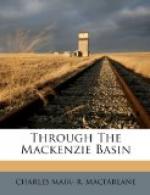The more immediate motive for treating with the Indians of Athabasca has been already referred to, viz., the discovery of gold in the Klondike, and the astonishing rush of miners and prospectors, in consequence, to the Yukon, not only from the Pacific side, but, east of the mountains, by way of the Peace and Mackenzie rivers. Up to that date, excepting to the fur-traders and a few missionaries, settlers, explorers, geologists and sportsmen, the Peace River region was practically unknown; certainly as little known to the people of Ontario, for example, as was the Red River country thirty years before. It was thought to be a most difficult country to reach—a terra incognita—rude and dangerous, having no allurements for the average Canadian, whose notions about it, if he had any, were limited, as usual, to the awe-inspiring legend of “barbarous Indians and perpetual frost.”
There is a lust, however, the unquenchable lust for gold, which seems to arouse the dullest from their apathy. This is the primum mobile; from earliest days the sensational mover of civilized man, and not unlikely to remain so until our old planet capsizes again, and the poles become the equator with troglodites for inhabitants. No barriers seem insurmountable to this rampant spirit; and, urged by it, the gold-seekers, chiefly aliens from the United States, plunged into the wilderness of Athabasca without hesitation, and without as much as “by your leave” to the native. Some of these marauders, as was to be expected, exhibited on the way a congenital contempt for the Indian’s rights. At various places his horses were killed, his dogs shot, his bear-traps broken up. An outcry arose in consequence, which inevitably would have led to reprisals and bloodshed had not the Government stepped in and forestalled further trouble by a prompt recognition of the native’s title. Hitherto he had been content with his lot in these remote wildernesses, and well might he be! One of the vast river systems of the Continent, perhaps the greatest of them all, considering the area drained, teeming with fish, and alive with fur and antler, was his home—a region which furnished him in abundance with the means of life, not to speak of such surplus of luxuries as was brought to his doors by his old and paternal friend, “John Company.” His wants were simple, his life healthy, though full of toil, his appetite great—an appetite which throve upon what it fed, and gave rise to fabulous feats of eating, recalling the exploits of the beloved and big-bellied Ben of nursery lore.




